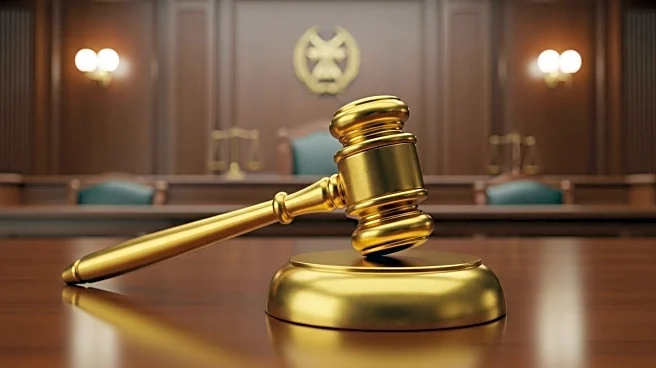What's Happening?
A federal judge has dismissed a lawsuit filed by the Trump administration against all federal judges in Maryland. The lawsuit was an attempt to challenge a standing order that requires a 48-hour delay before deportations can proceed, allowing time for habeas petitions to be heard. This order was put in place after the administration previously attempted to deport individuals without proper judicial review. The case was moved to Virginia and assigned to Judge Thomas Cullen, a Trump appointee, who dismissed the case. Judge Cullen criticized the administration's approach, noting the unprecedented nature of the executive branch's efforts to undermine judicial authority by labeling judges as 'activists' or 'unconstitutional' when they rule against the administration.
Why It's Important?
This development highlights the ongoing tension between the executive branch and the judiciary, particularly under President Trump's administration. The dismissal of the lawsuit underscores the judiciary's role in maintaining checks and balances within the U.S. government. The administration's attempt to bypass judicial review in deportation cases raises concerns about the erosion of legal protections for individuals facing deportation. The case also reflects broader issues of executive overreach and the politicization of the judiciary, as the administration has frequently criticized judges who do not rule in its favor. This situation could have significant implications for the separation of powers and the independence of the judiciary.
What's Next?
The Trump administration may consider appealing the dismissal or pursuing other legal avenues to challenge the standing order. However, any further legal action would need to be based on specific cases rather than a blanket lawsuit against all judges. The administration's approach to immigration enforcement and its relationship with the judiciary will likely continue to be contentious issues. Legal experts and civil rights organizations may increase their scrutiny of the administration's actions, potentially leading to more legal challenges and public debate over the balance of power between the branches of government.
Beyond the Headlines
The case raises ethical questions about the use of executive power and the potential for abuse when the judiciary is undermined. It also highlights the cultural and political divide in the U.S., where judicial decisions are increasingly viewed through a partisan lens. The administration's rhetoric against judges could have long-term effects on public trust in the judicial system and the perception of judicial impartiality. This situation underscores the importance of upholding the rule of law and ensuring that all branches of government operate within their constitutional limits.









